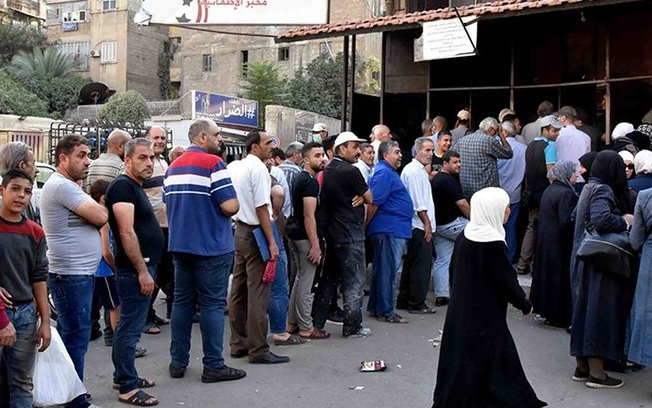People queue for bread in Damascus, Syria, October 7, 2020
UPDATE, MARCH 20:
The UN’s World Food Programme reports “key food security indicators in Syria…at critical levels” with a 222% year-on-year increase in food prices and a 376% rise since October 2019.
A WFP survey found 47% of Syrian households in a poor or borderline situation with food consumption, as they “rely on increasingly severe negative coping strategies”.
ORIGINAL ENTRY: On the 10-year anniversary of Syria’s conflict, residents in areas held by the Assad regime are speaking of their hunger, anger, and fear.
In a run-down district of Damascus, 52-year-old construction foreman Yaseen al-Obeid tells Reuters, “Every time I go to bed I say to myself that I hope a rocket comes and kills me and rids me of this life.”
Obeid makes about SYP 60,000/month. But the currency — which was 47:1 v. the US dollar in March 2011 — collapsing to more than 4,250:1, the foreman’s income is equivalent to less than $15/month. That is enough to buy only 2 kg (4.4 lbs) of lamb meat.
So Obeid carries bricks to try and feed his wife and six children.
Inflation is between 180% and 300%, with the price of bread rising 247% last year and the cost of a kilogram of sugar tripling since January. The average salary of a public sector worker is about the same as that of the foreman Obeid: SYP 50,000 per month.
This week Bashar al-Assad decreed an extra $12.50 payment for civil and military employees and $10 for pensioners. But that came a day after the regime raised the price of fuel by more than 50%, in the third increase this year, and the cost of cooking gas by 37%.
With the regime struggling to secure imports via tenders, there are shortages of basic foods, water, and other essentials. Electricity blackouts are common.
On social media, one resident summarized the mood, “The amount of depression and negative energy in the atmosphere in the country is beyond description.”
See also Syria: “Half of My Day is Spent Waiting for Bread”
“How Can We Fight Corruption and Bribery?”
The regime blames US and European Union sanctions, imposed on Assad, his family, and military and financial actors over war crimes. A banking crisis in neighboring Lebanon, where many Syrian businesses and individuals hold accounts, has accelerated the crisis.
Damascus businessman Khalil Touma says, “You don’t have sources of foreign currency, neither oil nor wheat – all of it we are paying from scarce hard currency.”
But residents also cite the 75% fall in GDP since 2011, widespread corruption, and the regime’s failures.
Iskander Najoum, who served in a pro-Assad militia, vents his anger with officials who have taken funds meant to compensate farmers for devastating forest fires last October.
How are we going to fight corruption and bribery? How can an employee live on 60,000 [Syrian] pounds? Is this our reward for standing up to terrorism for 10 years and giving everything?
Prominent actor Ghassan Masoud appealed:
Do not pay a citizen a monthly salary of 50,000 SYP where he needs 800,000 SYP to live with dignity and then ask for political stances of patriotism and slogans. I am a vegetarian, but I do not accept that a citizen is not able to eat meat because one kilogram costs 20,000 SYP….
The war of hunger, poverty, and the economy scares me more than the war of cannons.
Businessman Touma adds, “There are a lot of decisions taken by the government that actually put up obstacles rather than make matters easier….There is extreme spending on luxuries by a group who pay in foreign currency.”
Even a mention of the economic crisis, and the regime’s role, is risky. Hala Jerf, a well-known pro-Assad presenter, was arrested at a checkpoint near Damascus in January on her way to work. Her “crime” was criticism of the regime in Facebook entries.
“Putting the spotlight on corruption and the corrupt is a bigger crime than corruption itself,” says Jerf’s sister Rajaa.
Meanwhile, foreman Obeid talks of the anguish of his children going to bed hungry: “My son tells me ‘I have not filled my stomach’. They sleep without eating.”


Trackbacks/Pingbacks